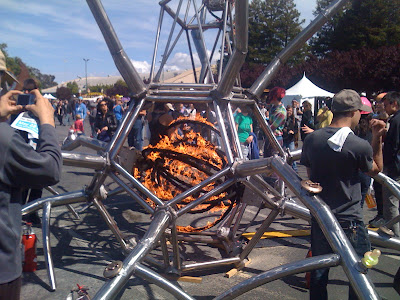My friend
Amy Bruckman has been talking about her failed attempts to maintain separate online personalities for her personal and professional lives.
Me too. I have a very vague and gauzy separation of the different facets of my online life, and those from my real life one. (see
here also, and look, it's in
the NY Times today).
It got me thinking about how I'd like to divide up my online life, assuming I had infinite time to maintain separate masks to different parts of the world:
- personal life: family, friends, real-world activities
- work life: computation, biology, hacking, the internet, business
- intellectual life: thoughts on economics, history, philosophy, polticial science, and other fields I take an amateur's interest in
- cultural life: books, movies, music, etc
- spiritual life: the deepest longings of the soul
Each of these spheres defines a separate imaginary audience, has separate conventions and separate rules for what constitutes an interesting or acceptable interaction. But the boundaries are blurry, the categories collapse into each other (and in some cases could be subdivided further). I can't keep these separate, yet they don't really fit together. I feel like my real self is something like the union of these sets, but discretion indicates I should only post material that is in the intersection of them, which is pretty close to empty.
Of course, the real irony is that the only reason to have a blog is to scream to the world, "me, me, look at me,
I'm so interesting, I'm so great". If so, what's the point of hiding yourself behind a set of masks? But you could say something similar about human communication in general. We are always putting on a mask, staging an act, constructing a persona. The difference is that in the physical world we can use the structure of the physical environment to manage and cue the different roles we play.
The great sociologist Erving Goffman wrote a great deal about the techniques people use to stage their public life, in books like
Interaction Ritual and
The Presentation of Self in Everyday Life. For example, he talks about the distinction between front and back regions, based on the areas within theater. On stage, a certain performance takes place, back stage the artifice is relaxed, but other types of performance take place. Goffman identifies similar structures in work life, for example, a medical office, where certain rules of conduct apply in areas where patients are, and others where doctors and staff congregate behind the scenes (or a the seating area and kitchen of a restaurant, to take an even clearer example).
Goffman talks about how different roles are played out in different contexts and how the tension between front and back areas is exploited by (for example)
shills, who are members of the team putting on a performance who pretend to be members of the audience to channel energies of the actual audience memebers. In the land of the internet, shills are sometimes called
sock puppets, which doesn't quite capture the institutionalization of such activity as found in casinos and elsewhere. Lee Siegel got mocked and fired for his sock-puppetry (although he hasn't lost his pundit licensesince he still publishes thumbsucker books and essays in the NY Times), but could he plausibly claim that he was just giving vent to the separate personas that we all have. Would the offense have been the same if the New Republic hired an intern to post enthusiastic comments on his blog (eg, if there was a real separate person performing the role)?
The Internet erases all boundaries and cueing strategies, and as more social life is conducted through social media it is harder to know how to act. Are we onstage or backstage, and what is the nature of the show we are in? Random bits of banter that people exchange as teenagers come back to haunt them as adults, in job applications or other formalized situations. The deep structure of social life is dissolved; we're left putting on an act without knowing who it's for; whether at any particular time its supposed to be serious or funny, formal or informal.
The old-school internet didn't have these problems. "Social media" consisted of email lists; the archives of such things were generally private, and it was no problem to present one face to a list concerned with knowlege representation and another that dealt with anarcho-surrealist art, if those happened to be two of your interests. The advent of Google and Facebook has changed that. Is this some kind of unstoppable dynamic, sort of like how global capitalism flattens boundaries and winds up with everybody connected and competing? Or will there be a reaction, with people withdrawing and figuring out ways to put boundaries around parts of their lives?
Just in the last few weeks, Facebook has been
subject to
severe criticism for its increasingly cavalier approach to privacy. Durkheim (via Goffman) sums up why:
The human personality is a sacred thing; one does not violate it nor infringe its bounds, while at the same time the greatest good is in communion with others.
Goffman's work partly undermines this idea. In his detailed descriptions of social interaction, the persona is a carefully forged tool for getting a job done, a construct, a mask. The sacred part is hidden inside somewhere, occasionally shining through, protected by the concentric boundaries of social space. Because Facebook and other social media blithely destroy these boundaries, they are in effect desecrators.
[update: found an academic treatment of this problem: The problem of conflicting social spheres: effects of network structure on experienced tension in social network sites, by Jens Binder et al]


